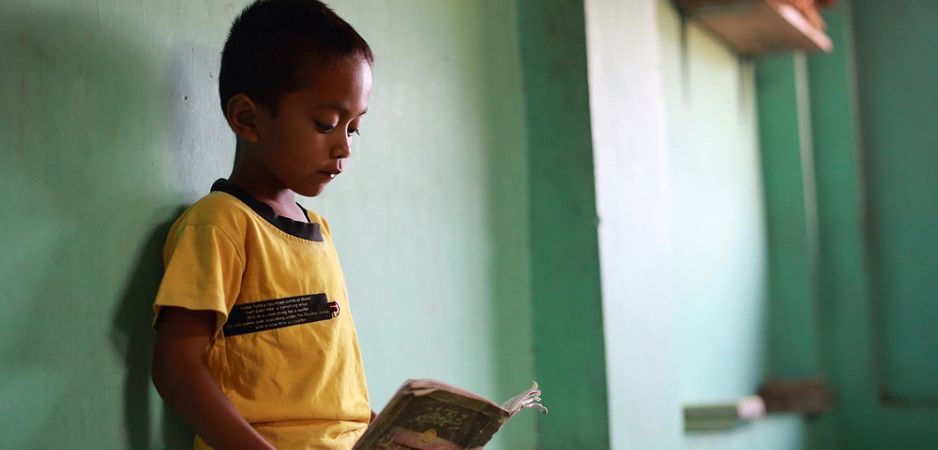The reason schools and teachers are reluctant to welcome students with disabilities into their institutions is due to the challenges they face.
On August 17, Indonesia marks 72 years since its independence. For many, this day symbolizes the country’s long battle to fight for what its founding fathers pledged: among others, to eradicate ignorance and to educate society.
In this long ride toward a better education system, Indonesians have seen their fair share of ups and downs. But the journey really started 14 years ago when the Law on the National Education System No. 20/2003 was enforced. This meant that a minimum of 20% from the state budget was allocated for the education sector. For many, this is one of the government’s greatest achievements to date in fulfilling its commitment to educate the people of Indonesia.
When President Joko “Jokowi” Widodo took office in 2014, the Kartu Indonesia Pintar, the Indonesian smart card, was launched and free tuition for primary education was established. Under his administration, Jokowi aims to ensure that young people get a basic education.
Despite such moves, not everyone has benefited. This is particularly true for Indonesia’s young, disabled generation. For them, acquiring primary school education is very difficult, let alone finishing high school. In fact, many of them do not go beyond primary level. In a recent study, the University of Indonesia found that nearly 70% of disabled children do not go to school, and if they do, they only have 67% chance of finishing primary education.
Looking at this statistic, the government should turn its focus on how to ensure that the 20% of budget allocation for the education sector is spent wisely not only to improve the education system, but also to make it more inclusive.
Inclusive Education in Indonesia
Today, there are only 2,070 special schools, consisting of both public (26.3%) and private institutions (73.7%) with over 121,000 students, where the majority are currently enrolled in elementary school (more than 80,000). The Ministry of Education and Culture says the number of students with disabilities enrolling in senior high school for 2016-17 is only 13,802. The reason is largely due to the number of inclusive senior high schools — only 74 in the entire country.
The situation is further worsened by the poor quality of the curriculum in these special schools. The appropriate curriculum that is designed according to the students’ capabilities is almost nonexistent. As a consequence, parents are reluctant to send their children to special schools. Meanwhile, normal public schools refuse to accept disabled children, citing the lack of facilities and experiences in accommodating those with special needs.
Therefore, the latest regulation to ensure the rights to education for people with disabilities — Law No. 8/2016 — has been enacted in order to cater for the growing trend of inclusive education. It is hoped the ruling will help eliminate the segregation of the education system for the disabled. Inclusive education translates as an effective vehicle to integrate students with disabilities into a mainstream classroom, as well as to provide them with a tailored curriculum best suited to their learning abilities.
In the efforts to better accommodate the demand of parents who want their children to have access to a standard curriculum, there are also government-appointed mainstream schools where children with disabilities can apply to. However, the quantity is very few, and not all provinces have properly implemented this recent policy change.
In the case of Yogyakarta, which has been chosen by UNESCO as a model for inclusive education in the Association of Southeast Asian Nations (ASEAN) since 2013, the governor has appointed 46 schools to integrate inclusive education into their general program. The aim is to give parents who have children with disabilities the legally protected rights to enroll in mainstream schools. It also gives an alternative option for parents searching for a better quality education in private schools whose tuition fees are insanely high.
 Although this appears to be an improvement, many schools have not put this policy into practice. Despite the fact there are many workshops and seminars about inclusive education in Indonesia, schools are doing little to prepare teachers. The courses are often too generic and perfunctory. The trainings also do not do provide clear guidance in dealing with different kinds of disabilities that students may have.
Although this appears to be an improvement, many schools have not put this policy into practice. Despite the fact there are many workshops and seminars about inclusive education in Indonesia, schools are doing little to prepare teachers. The courses are often too generic and perfunctory. The trainings also do not do provide clear guidance in dealing with different kinds of disabilities that students may have.
While two or three well-trained teachers from special schools are assigned to each government-chosen school to monitor students with special needs, they are only required to visit several times in a month. Therefore, immediate assistance may be unavailable when needed. As a result, oftentimes the main teachers are left to figure out how to deal with their disabled students. The reason schools and teachers are reluctant to welcome students with disabilities into their institutions is due to the challenges they face.
There are three solutions to address these issues.
First, extensive training should be given to teachers to help them work with disabled students, and this should focus on the different methods of teaching that can be applied in classrooms. Of course, the training materials should not only concentrate on a certain type of disability. These teachers should also be given the opportunity for comparative teaching practice from their counterparts who work in special needs or private schools. By doing so, they will be able to learn about how to accommodate those with special needs.
Second, the Ministry of Education’s representative in every city is encouraged to hire full-time teachers with special needs experience in every inclusive public school as regular assistance is required. The availability of such teachers in every school would increase confidence on the part of educational institutions and their teachers to accept students with special needs.
Third, there is also a need to raise awareness among public schools about their legal duty to accept students with disabilities, as stipulated in Law No. 8/2016. If they do otherwise, it means they have disregarded the founding fathers’ vision that education should be for the entire nation, without exception.
The views expressed in this article are the author’s own and do not necessarily reflect Fair Observer’s editorial policy.
Photo Credit: Wattana / Shutterstock.com
Support Fair Observer
We rely on your support for our independence, diversity and quality.
For more than 10 years, Fair Observer has been free, fair and independent. No billionaire owns us, no advertisers control us. We are a reader-supported nonprofit. Unlike many other publications, we keep our content free for readers regardless of where they live or whether they can afford to pay. We have no paywalls and no ads.
In the post-truth era of fake news, echo chambers and filter bubbles, we publish a plurality of perspectives from around the world. Anyone can publish with us, but everyone goes through a rigorous editorial process. So, you get fact-checked, well-reasoned content instead of noise.
We publish 2,500+ voices from 90+ countries. We also conduct education and training programs
on subjects ranging from digital media and journalism to writing and critical thinking. This
doesn’t come cheap. Servers, editors, trainers and web developers cost
money.
Please consider supporting us on a regular basis as a recurring donor or a
sustaining member.
Will you support FO’s journalism?
We rely on your support for our independence, diversity and quality.






